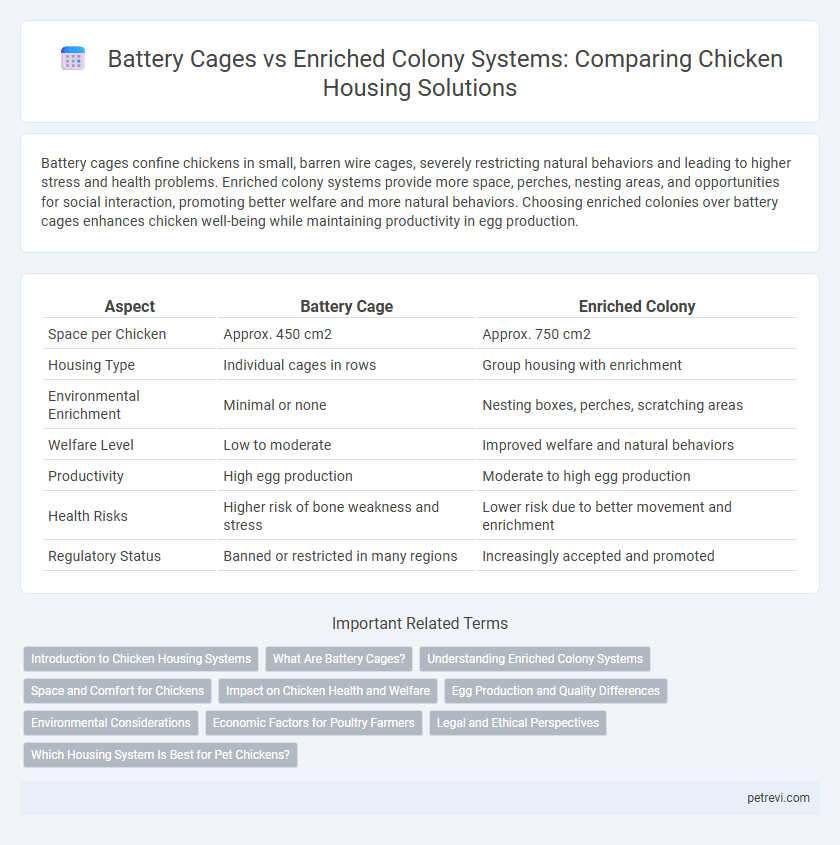Battery cages confine chickens in small, barren wire cages, severely restricting natural behaviors and leading to higher stress and health problems. Enriched colony systems provide more space, perches, nesting areas, and opportunities for social interaction, promoting better welfare and more natural behaviors. Choosing enriched colonies over battery cages enhances chicken well-being while maintaining productivity in egg production.
Table of Comparison
| Aspect | Battery Cage | Enriched Colony |
|---|---|---|
| Space per Chicken | Approx. 450 cm2 | Approx. 750 cm2 |
| Housing Type | Individual cages in rows | Group housing with enrichment |
| Environmental Enrichment | Minimal or none | Nesting boxes, perches, scratching areas |
| Welfare Level | Low to moderate | Improved welfare and natural behaviors |
| Productivity | High egg production | Moderate to high egg production |
| Health Risks | Higher risk of bone weakness and stress | Lower risk due to better movement and enrichment |
| Regulatory Status | Banned or restricted in many regions | Increasingly accepted and promoted |
Introduction to Chicken Housing Systems
Battery cage systems confine chickens in small wire compartments, maximizing space efficiency but limiting natural behaviors and welfare. Enriched colony systems provide larger group housing with perches, nest boxes, and scratching areas that promote behavioral expression and improved welfare. Transitioning from battery cages to enriched colonies aligns with evolving animal welfare standards and consumer demand for humane production.
What Are Battery Cages?
Battery cages are small, barren wire enclosures used in conventional poultry farming to confine hens for egg production, severely restricting movement and natural behaviors. These cages typically house multiple chickens in a dense arrangement, leading to welfare concerns due to limited space, lack of perches, and no nesting areas. Regulatory changes in many regions aim to phase out battery cages in favor of enriched colony systems that provide improved living conditions with better space, perches, and nesting options.
Understanding Enriched Colony Systems
Enriched colony systems provide chickens with more space, perches, and nesting areas compared to traditional battery cages, significantly improving animal welfare and natural behaviors. These systems reduce stress and promote better health by allowing hens to express activities such as dust bathing and wing stretching. Research shows enriched colonies can enhance egg quality and reduce mortality rates while meeting regulatory and consumer demands for humane housing.
Space and Comfort for Chickens
Battery cages provide approximately 450 cm2 of space per hen, restricting natural behaviors and causing discomfort, while enriched colony housing offers at least 750 cm2 per bird, allowing more movement and improved welfare. Enriched colonies include perches, nesting areas, and scratching pads, enhancing comfort and promoting natural behaviors. The increased space and environmental enrichments in colony systems significantly reduce stress and injury compared to conventional battery cages.
Impact on Chicken Health and Welfare
Battery cages restrict movement and natural behaviors, leading to increased stress, bone weakness, and higher susceptibility to diseases in chickens. Enriched colonies provide perches, nesting areas, and more space, promoting better physical health, improved bone strength, and reduced stress levels. Studies show enriched housing significantly enhances welfare by allowing chickens to express natural behaviors and reducing mortality rates.
Egg Production and Quality Differences
Battery cage systems prioritize high-density confinement, resulting in elevated egg production rates but often compromise egg quality due to stress and limited movement. Enriched colony housing provides more space, perches, and nesting areas, improving hen welfare and leading to better shell strength and reduced incidence of cracked eggs. Studies reveal that eggs from enriched colonies tend to have higher nutritional value and consumer preference despite slightly lower production metrics compared to battery cages.
Environmental Considerations
Battery cage systems for chicken housing significantly restrict natural behaviors and generate high concentrations of ammonia, negatively impacting air quality and animal welfare. Enriched colony housing offers increased space, perches, and nesting areas, promoting better ventilation and reducing waste buildup, thus mitigating environmental pollution. Implementing enriched colonies can decrease overall environmental footprint by improving manure management and lowering greenhouse gas emissions compared to conventional battery cages.
Economic Factors for Poultry Farmers
Battery cage systems offer lower initial investment and reduced feed costs due to space efficiency, making them economically attractive for large-scale poultry farmers. Enriched colony housing incurs higher construction and maintenance expenses but can lead to improved bird welfare and potentially higher egg quality, which may command premium market prices. Farmers must weigh short-term cost savings against long-term benefits of animal health and market demand when selecting between these housing systems.
Legal and Ethical Perspectives
Battery cage systems are increasingly restricted by animal welfare legislation in regions such as the European Union, where directives mandate the phasing out of conventional cages in favor of enriched colony systems that provide more space, perches, and nesting areas. Enriched colony housing aligns with ethical standards by improving hens' natural behaviors, reducing stress, and promoting better health compared to the cramped conditions and limited mobility of battery cages. Legal frameworks emphasize animal welfare compliance, making enriched colony systems a preferred choice for producers seeking to meet regulatory requirements and ethical consumer expectations.
Which Housing System Is Best for Pet Chickens?
Enriched colony systems provide more space, perches, and nesting areas compared to traditional battery cages, enhancing the welfare of pet chickens by allowing natural behaviors like foraging and dust bathing. Battery cages, often criticized for confinement and lack of enrichment, restrict movement and cause stress-related issues, making them less suitable for maintaining healthy and happy pet chickens. Choosing enriched colony housing improves overall chicken health, egg quality, and longevity, making it the preferred option for responsible pet chicken owners.
Battery Cage vs Enriched Colony for Chicken Housing Infographic

 petrevi.com
petrevi.com